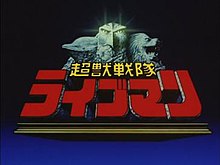This article may contain an excessive amount of intricate detail that may interest only a particular audience. (August 2024) |
| Choujyu Sentai Liveman | |
|---|---|
 The first title card for Choujyu Sentai Liveman | |
| Genre | Tokusatsu Superhero fiction Science fiction Adventure Drama |
| Created by | Toei Company |
| Developed by | Hirohisa Soda |
| Directed by | Takao Nagaishi |
| Starring | Daisuke Shima Kazuhiko Nishimura Megumi Mori Seirou Yamaguchi Jin Kawamoto Jouji Nakata Yutaka Hirose Akiko Amamatsuri Toru Sakai Yoshinori Okamoto |
| Narrated by | Takeshi Kuwabara |
| Composer | Tatsumi Yano |
| Country of origin | Japan |
| No. of episodes | 49 |
| Production | |
| Producers | Takeyuki Suzuki Kyōzō Utsunomiya |
| Running time | 25 minutes |
| Production companies | TV Asahi Toei Company Toei Advertising |
| Original release | |
| Network | ANN (TV Asahi) |
| Release | February 27, 1988 – February 18, 1989 |
| Related | |
| Infobox instructions (only shown in preview) | |
Choujyu Sentai Liveman (超獣戦隊ライブマン, Chōjū Sentai Raibuman, Super Beast Squadron Liveman) is a Japanese tokusatsu television series and the twelfth entry of Toei Company's Super Sentai metaseries. The last Super Sentai title of the Shōwa Era,[1] it aired on TV Asahi from February 27, 1988 to February 18, 1989, replacing Hikari Sentai Maskman and was replaced by Kousoku Sentai Turboranger. Its international English title as listed by Toei is simply Liveman.[2]
It was the first Super Sentai series to have a female Blue Ranger as well as the first Super Sentai series that introduced animal-based mecha. It was also the first Super Sentai series that introduced a super-combined robot (that is 2 or more robots put together); the first Super Sentai series to have three members from the start, with two additional members joining later on; it was the last Super Sentai series that had its mechas transported to the battle through a flying fortress on a regular basis, which would not occur again until Bakuryū Sentai Abaranger; and it was the first Super Sentai series to have both a Green Ranger and a Black Ranger in the main five, as opposed to interchanging one with another, which would not occur again until Engine Sentai Go-onger 20 years later.
- ^ "超獣戦隊ライブマン特集". 東映ビデオ株式会社 (in Japanese). 1988-02-01. Retrieved 2020-10-26.
- ^ "Library -- English Titles -- TOEI TV Website". Archived from the original on 2009-01-19. Retrieved 2011-03-26.